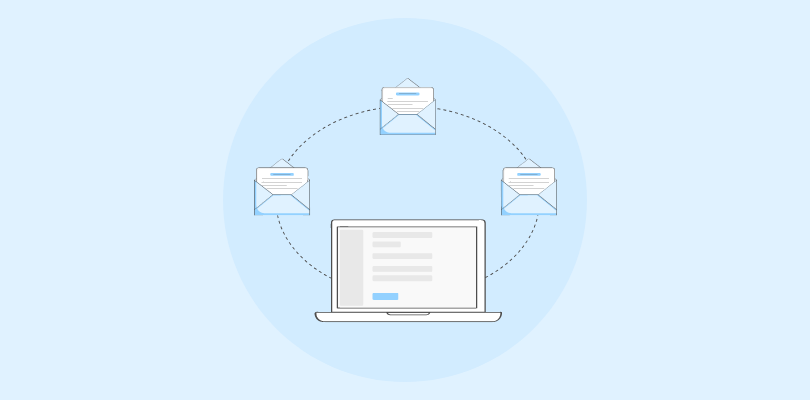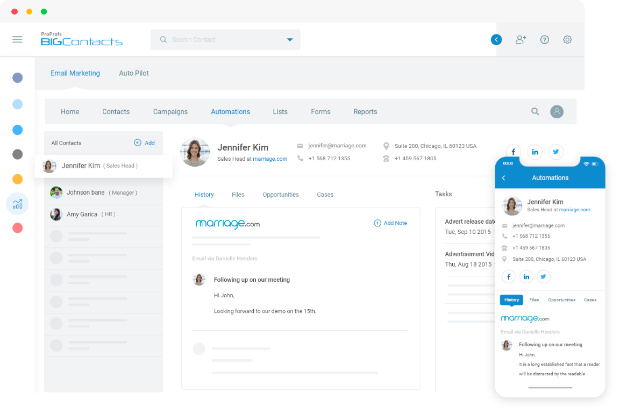Has email marketing run its course?
This question gets thrown around quite a lot these days.
While emails continue to be the most popular engagement channel, the overwhelming spam that users receive puts its credibility at stake.
So, is it really wise for business owners to continue promoting their products and services through emails?
A straightforward answer would be yes!
But there’s a catch. You need a well-crafted email marketing campaign to ensure that your emails are not a nuisance for the recipients.
Still on the fence about it?
Consider the various advantages and disadvantages of email marketing mentioned below. This can help you identify whether investing in email marketing is the right decision for your enterprise.
Discover the role of CRM in email marketing and how to utilize it effectively. Also, find out ways to ensure that your potential and existing customers do not consider your email offerings as spam.
What is Email Marketing?
Email marketing approaches prospective and existing customers with relevant and informative content.
Essentially, it is a marketing channel used by businesses to promote their offering and stay connected with clients.
These emails are welcomed since the recipients have demonstrated some willingness to receive them.
It is important to note that email marketing is not just sending ads, requesting business, or soliciting sales. Rather, it is communication that is specifically designed to build loyalty, trust, and brand recognition.
It provides you the opportunity to get to know the prospects and guide them toward the final purchase decision. Along with reaching out with promotional content to potential customers, email marketing allows you to stay connected with existing customers to encourage repeat purchases.
You can customize your email outreach based on the prospects’ position in the buying process. Additionally, you can enhance your personalization efforts by tracking how customers interact with your emails.
Email has long occupied an eminent domain in the marketing world.
But recent doubts about the risks associated with emails marketing beget the question-
Should marketers continue to prioritize emails for communicating with prospects and customers?
To achieve the expected results from your email marketing efforts, you need a well-designed marketing plan. This includes list building, customer segmentation, targeting, and performance tracking. You also need to understand various email advantages and disadvantages to avoid inconsistencies in your strategy.
To further clarify what email marketing definitely isn’t, let’s define what constitutes spam and how it can harm your enterprise.
How is Email Marketing Different From Spam?
There exists a thin line between email marketing and spamming.
Businesses that overlook the differences between the two end up losing their credibility.
Therefore, it is important to understand what spam means.
Spam is a marketing approach that is unsolicited and not welcomed by the audience. It does not provide valuable information to the recipient.
Spam typically involves emails sent to random people. It is characterized by misleading subject lines and poorly crafted content.
Since the recipient has not demonstrated any willingness to accept the emails, they would likely be irritated upon receiving them.
Email marketing, on the other hand, is a well-thought-out marketing strategy that provides value to the recipient.
People have different definitions of what makes emails spam.
While some place frequency of the emails as the deciding criteria, other people classify commercial emails as spam.
Since several risks are associated with spamming clients, you need to be careful about what you share with your contacts via email client.
Read More: How Your Emails Can End up in a Spam Folder
What are the Advantages and Disadvantages of Email Marketing?
Email is considered a quick and cost-effective way of connecting with existing and potential customers.
Understanding the advantages and disadvantages of email marketing can help you devise a proper marketing plan that brings in more revenue.
While several pros and cons of email marketing exist, it all comes down to how you utilize it.
You need to craft an effective marketing strategy that considers your audience’s expectations and your branding plan. Keeping your message consistent and focused on the customers’ needs is critical.
The following email marketing advantages and disadvantages can help you make a more informed decision about it.
What are the Benefits of Email Marketing?
Email marketing offers an ROI of $42 for every $1 spent.
This goes on to prove the channel’s effectiveness and productivity.
Email marketing, if utilized properly, can considerably impact your business’s conversion rate. It can also help you acquire clients’ trust by making interactions more personal.
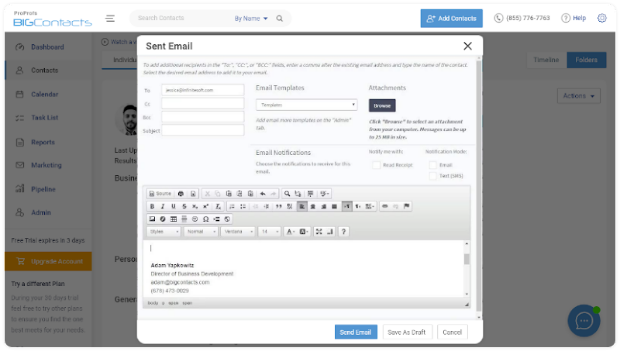
The most significant benefits of email marketing include:
Better Business Communication:
Emails can considerably improve business communication as a quick way of engaging with contacts.
Any information can be shared with clients with just a click. This makes it highly effective for time-sensitive communications.
More Targeted Marketing:
Email marketing provides you the opportunity to craft more delightful and personalized customer experiences. This builds stronger relationships and improves your bottom line.
You can build segmented marketing lists by extracting emails from LinkedIn or other social media accounts and make your marketing more targeted using email marketing.
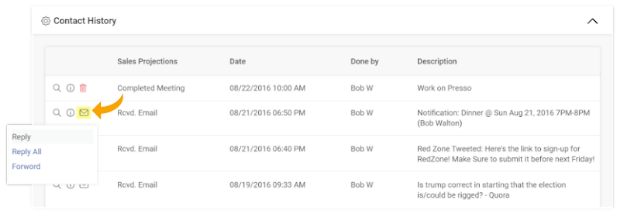
Improved Sales:
With email marketing, you can drive your sales and profits significantly.
This is a result of timely interactions and enhanced personalization. Using email marketing, you can nurture leads and even stay connected with customers post-purchase.
Time-Saving:
Automated email marketing can help you save time by connecting with the prospects at the right moment. For instance, you can automate emails to be delivered to a customer based on actions taken by them, such as signing up for the newsletter or becoming eligible for a promotional offer. You can also use and store pre-designed templates to save more time.
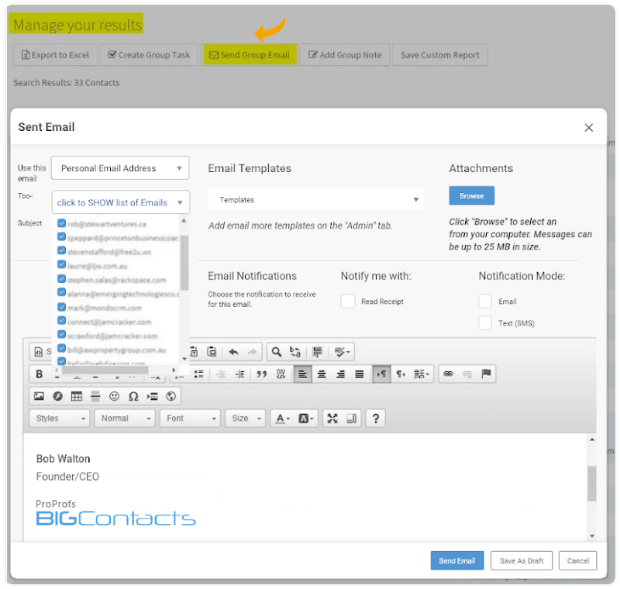
Cost-Effectiveness:
One of the email marketing benefits that make it so widely popular is cost-effectiveness.
This marketing channel is highly inexpensive compared to others and produces excellent outcomes. You can reach out to many prospective customers in one go using email marketing campaigns.
Enhanced Visibility:
An important advantage of email marketing is that it is measurable. You have a clear picture of how many emails you are sending out and what types of results they are producing. You can easily monitor how well your campaigns perform by tracking open rates, clicks, and conversions rates. This data can help you optimize upcoming campaigns and make them more effective. You can also A/B test your emails to find out what performs better.
Customer-Centric Marketing:
Email marketing provides you the chance to make your marketing efforts customer-oriented. Additionally, seeking permission from the contacts before sending them emails helps them feel more in control over the conversation. Emails are also much less intrusive and allow customers to manage how they wish to receive the emails.
Identify Engaged Customers:
You can identify customers who show genuine interest in your business through email marketing by engaging with your campaigns. This can help you qualify prospects and focus more attention on high-value leads.
Complete Control Over Campaigns:
One of the best pros of email marketing is that you can customize your emails to match your branding strategy. This helps you deliver consistent marketing messages to the prospects. This flexibility makes emails a highly effective and preferable method of marketing.
Businesses can keep their marketing efforts aligned with their business objectives with better control over the type and frequency of emails delivered to clients.
Scalable Channel:
Scalability is one of the most important advantages of email marketing.
Along with being exceptionally effective and flexible, email marketing is also easy to scale and optimize.
You can expand your email lists and reach out to more prospects with relevant offers and content.
Environmentally Friendly:
Emails are an environmentally friendly means of communication with prospects and customers. Since no printing or distribution is involved, emails are much less expensive and environmentally harmful than other forms of advertising.
Disadvantages of Email Marketing
While email marketing presents several advantages, its overuse can result in spamming.
If your email list is not well-updated, you run the risk of irritating your customers with irrelevant emails.
This is when email marketing can do more harm to your business than good.
Some of the most significant email marketing disadvantages include:
Risk of Spamming:
Frequently sending irrelevant emails to the clients is categorized as spam.
Spamming is one of the most common disadvantages of email.
These emails irritate the recipients since they are not receiving relevant information. Consequently, they may unsubscribe from your mailing list.
Likelihood of Unresponsiveness:
It is improbable that you will get a response from the customer with any run-of-the-mill email.
In order to get a positive response, you must provide high-value content that is personalized and captures the reader’s attention.
Lack of personalization or emails that are too focused on selling instead of providing value to the customers can drop the open and click-through rates of marketing emails.
Ineffective Resource Utilization:
Since there are chances that a large number of emails may go unnoticed, it can be a wastage of time and resources for your team members.
To avoid this, you require a well-designed marketing strategy that makes the best use of emails and leverages them to drive sales.
Damaged Company Reputation:
Your business’s reputation can take a hit if the recipients consider your emails spam.
To avoid this, you need to focus on the quality of the content you deliver via emails. Spam can hamper your credibility and reputation.
Undelivered Emails:
If your emails are detected as spam due to the inclusion of certain spam keywords, they will not reach the recipient’s inbox. To ensure that your emails are not filtered out, you need to craft the content well.
Website Blocking:
Unsolicited emails can result in your website being blocked or suspended.
If you send a lot of unwanted emails, the recipients will likely report your website and block emails. This poses a considerable risk to your business.
Data Protection:
You must ascertain that your emails follow the data protection guidelines and do not compromise customer privacy.
This requires a security-compliant tool that effectively stores and manages customer information and saves you from severe penalties.
Managing Mailing List:
A successful email marketing campaign requires well-crafted content and properly designed emails. You also need to build and maintain your mailing list continuously. This requires encouraging visitors to sign up to your email list by offering them value. You also need to clean and update your mailing list regularly to ensure that the emails are being delivered to the correct recipients.
Opt-in Email Marketing
As is evident from the name, opt-in emails involve getting the recipients’ permission before adding them to the mailing list.
It is a highly effective way of email marketing. It includes commercial emails delivered to people who have indicated willingness to receive it.
Since the recipient has willingly opted-in for the emails, you wouldn’t have to worry about your emails being considered unsolicited.
Opt-in email marketing offers the following advantages:
- Your business’s reputation can be harmed if your emails come across as spam. The opt-in strategy prevents this by eliminating any hint of spamming. Since you have permission to contact the person, you can rest assured that your emails won’t be considered spam.
- Seeking permission from the recipients indicates to your leads and existing clients that you respect them and their privacy. This helps boost credibility and builds loyalty among your clients.
- Your sales team can become more productive by narrowing your lead pool using opt-in marketing. They can focus on leads that are actually interested in your business and drive more conversions.
- By letting the recipients manage their preferences, you demonstrate that your business cares about their interests. Offering subscribers control over what they choose to receive can boost interest in your products and services.
- Opt-in emails also help save time and money that would otherwise be spent on following and nurturing leads unlikely to result in actual customers.
Getting the Most out of Opt-in Email Marketing
Opt-in marketing allows you to connect with prospects and customers without being intrusive. You can deliver value to your customers through emails that they willingly agree to receive. However, these emails have to be well-optimized and personalized for you to see real profits from them.
Having described the advantages of opt-in marketing, it’s essential to list various practices to optimize it. You need to adopt these practices to continue expanding your opt-in email lists and get the most out of them.
To grow your opt-in list, you should:
Set up an email sign-up form on every page of your website.
If a potential client is looking at more than just your homepage, it is a good indication that there is interest there. Capitalize on that interest by making it easy for the visitors to sign up for email campaigns from any page of the website.
Set your system to prompt a customer to fill out an email sign-up form at the time of every purchase.
It is easy to understand why this strategy works. If your customer has just purchased your product or service, they are obviously in a receptive mood at this moment. Use this momentum to your advantage by capturing permission to send emails now.
Get paper sign-ups when you engage in business in the real world.
For instance, if you set up a booth at trade shows, local street fairs, or community events, make sure to have sign-up slips available. Then, follow through by entering this valuable data into your CRM application upon return to your office.
Embed an email sign-up form in every email you post in a forum or on a message board.
Take advantage of casual interest in your product or service so that it can be nurtured into something more.
Offer discounts or promotions to those who sign up for emails.
The long-term benefits of getting solid leads in this manner far outweigh the costs of the discount or promotion.
Role of CRM in Email Marketing
Now that we have listed various advantages and disadvantages of email marketing let’s look at the role a CRM system plays in maximizing its effectiveness.
Customer relationship management tools are designed to help businesses store and manage customer data. This information can be leveraged to build stronger relationships by enhancing customer engagement.
CRM data aids personalization and helps businesses improve their interactions.
As a result, customer satisfaction and retention levels spike.
But, what role does CRM play in email marketing?
Essentially, CRM applications function as a repository of contact information. This can be utilized to improve email outreach by customizing it according to the users’ needs.
Additionally, CRM works against spam by culling a valid list of recipients who can reasonably be assumed to have an interest in your product or service.
You can share personalized emails from a custom domain from within or outside the CRM system. This flexibility improves the effectiveness of email marketing and keeps data organized at all times.
CRM software can also help you automate an effective opt-in email marketing process.
Here are the most significant benefits of including CRM in your email marketing strategy-
Personalize Messages:
CRM allows you to customize your emails to make them more personalized and engaging. Access to essential contact data helps make the email content relevant to your audience. You can share well-crafted emails, including attachments, to grab the attention of your prospects using CRM.
Centralized Access:
All the emails that you share are automatically logged against your contact records. With all interactions stored in one place, it is possible to view previous emails and modify upcoming engagements accordingly.
Customer Segmentation:
CRM allows you to build contacts lists for different audience groups. This improves targeting and saves time. By delivering emails to groups of contacts in one go, you can conserve time and effort.
Track Performance:
CRM reporting & analytics enable you to monitor essential metrics for your email marketing efforts. You can get more visibility into how the prospects interact with your emails and identify areas for improvement.
Automate Emails:
CRM allows you to create automated email sequences that deliver personalized emails based on the prospect’s position in the sales cycle.
These email campaigns automatically adjust based on the actions taken by the customers.
For instance, emails can be triggered automatically when a prospect replies or moves to the next stage of the sales funnel.
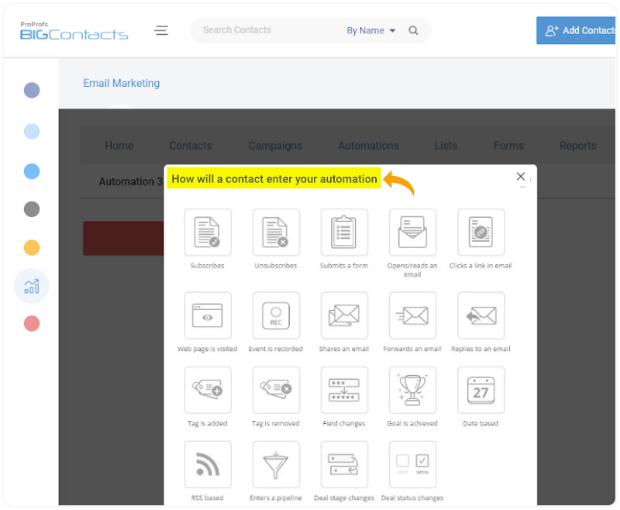
Integrations:
CRM systems offer integrations with several email programs that allow you to manage all interactions from one platform. All the incoming emails are captured and stored in the universal inbox, which eases things for your team members.
Better Collaboration:
Well-synchronized data enables everyone in the organization to stay updated. CRM keeps team members on the same page by providing unified access to data. With an efficient CRM system, all team members can share information and updates with each other effortlessly. This enhanced communication contributes to increased productivity and reduces inefficiencies.
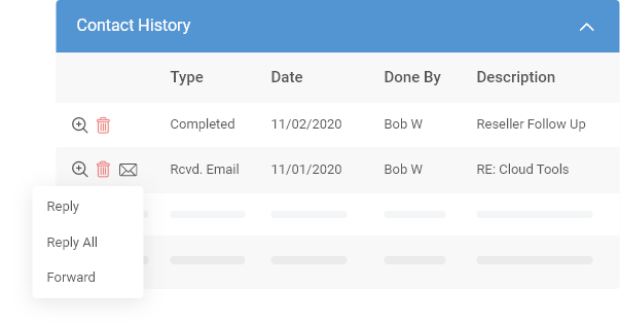
Timely Follow-Ups:
CRM helps identify the most optimal time to connect with the prospects. Additionally, it provides reminders to ensure that you engage with the prospects at the right time. You can also schedule the emails for being delivered at a later time.
Data Security:
A GDPR compliant CRM system can help businesses store and utilize their contact data in accordance with various data protection guidelines.
Read More: CRM or Email Marketing- Which One Should You Choose?
Email Marketing Pros & Cons
Here are some email marketing pros and cons to help you determine if it’s the right thing for your business.
Pros:
- It is cost-effective and much less expensive than other marketing methods.
- You get complete control over how to craft, schedule, and manage your emails.
- It is easy to measure and analyze.
- It can strengthen your branding strategy by being consistent with your brand message.
- You can easily automate emails to save time and enhance productivity.
Cons:
- It can be considered unwanted or spam by some people.
- You need to ensure your mailing list is up to date.
- You have to pay attention to data protection and privacy legislation.
- Spamming poses a threat to the brand image and website.
Email Marketing- Should You Invest in It?
With all the advantages and disadvantages of email marketing, the final question is-
Is it worth investing in email marketing?
The answer is a resounding yes.
If implemented correctly, email marketing can position a business as a credible name in the market. It can create a positive influence on the brand’s image.
However, it is critical to ensure that things do not go wrong and that the recipients do not categorize the emails as spam.
For this, you need to build and grow your email list. You must also understand direct mail advantages and disadvantages to create an efficient marketing strategy.
Additionally, you must employ the best email marketing practices to keep your emails consistent with your brand image and outreach efforts.
An easy-to-use CRM tool such as BIGContacts can help you craft and manage your email marketing campaigns effectively. It can allow you to automate emails, measure their performance and keep track of existing communications. Additionally, you can leverage the data stored in the CRM to improve your personalized marketing further.
Investing in the right CRM solution can considerably impact your email marketing efforts.
Pay attention to the usability, scalability, and flexibility of the CRM software that you choose. This can help you improve the quality of your emails and drive more meaningful relationships with prospects and customers.
Frequently Asked Questions
Here are some of the frequently asked questions about email marketing:
How can I improve my email outreach?
To improve your email marketing, you need to focus on personalization. The more relevant and engaging your email content is, the more positive will be the marketing outcomes. Therefore, you must ensure that whatever you are offering through emails matters to the customers. Focus on their needs and expectations when drafting the email strategy to maximize your chances of conversion.
How can I grow my mailing list?
To grow your email list, you can implement a variety of strategies. Ask for email ids from website visitors by adding forms, surveys, exit popups, etc. Seek permission from the visitors and offer them control over managing their email preferences.
What are various metrics that I can track to measure the success of my email marketing efforts?
To measure the effectiveness of your marketing efforts, you must track the most relevant metrics. These can include:
- Click-through rate
- Open rate
- Bounce rate
- Conversion rate
- Response time
- Unsubscribe rate
- Forwarding rate
What type of subject lines should i use in my email marketing?
Subject lines of the email are the perfect opportunity to grasp the attention of the clients.
Therefore, you need to ensure that you only use striking subject lines in your email.
Clearly state the objective of your email in the subject and try to keep it to the point. The more personalized and relevant your subject is, the higher are the chances of the recipient opening it.
FREE. All Features. FOREVER!
Try our Forever FREE account with all premium features!


